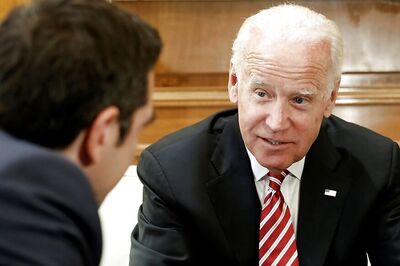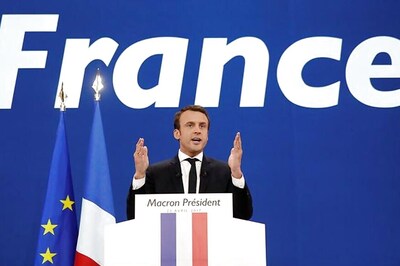
views
Former President Pranab Mukherjee, 84, who passed away in Delhi on Monday has often been described as a statesman and a scholar. But first and foremost, he was a true-blue politician. Before taking up residence at the Rashtrapati Bhavan, he had the distinction of occupying several key posts both in the government and the Congress.
And yet, history will remember Mukherjee (affectionately called Pranab Da) as the perennial Prime Minister-in-waiting who was always relegated to the number two slot.
Having been consistently denied the Prime Minister’s kursi, which Mukherjee rightly felt he deserved, the diminutive leader believed his next best option was to move to the Rashtrapati Bhavan. He used his finely-honed skills and the friendships he had forged across the political spectrum over the years to virtually force the Congress to name him as its Presidential candidate in 2012.
When he took over as the country’s first citizen the same year, the shift marked the culmination of a long political journey which began in 1969. The Rajya Sabha was his first port of call and he remained there for another four terms till he decided to enter the rough and tumble of electoral politics in 2004 when he contested and won the Jangipur Lok Sabha seat from his home state West Bengal.
This decision was prompted by a desire to prove his critics wrong, who whispered conspiratorially that Mukherjee had no mass base and was an armchair politician. When he did win, sceptics never tired of pointing out that he owed his victory to his one-time bete noire, West Bengal chief minister and Trinamool Congress Mamata Banerjee, who ensured he did not have too tough a time in the field.
Mukherjee was a valuable member of Indira Gandhi’s team, and went on to head the all-important finance ministry in the early eighties. But his meteoric rise in the Congress was cut short after Indira Gandhi’s assassination in 1984 when he (on being asked) explained to Rajiv Gandhi the constitutional position that in such instances, the senior most minister is appointed acting Prime Minister.
This was interpreted as a suggestion that Mukherjee, widely seen as Indira Gandhi’s successor, be appointed Prime Minister. This did not go down well with Rajiv Gandhi who then proceeded to marginalise Mukherjee.
Mukherjee subsequently left the Congress and formed his own party but could not go too far. He returned to the Congress fold after he made peace with Rajiv Gandhi in 1989. Two years later, when PV Narasimha Rao took over as Prime Minister, he inducted Mukherjee into his Cabinet. This proved to be a turning point as it meant he was back in the thick of things.
But disappointment was in store for him in later years. Mukherjee was predictably irked when he was overlooked for the Prime Minister’s post by Congress president Sonia Gandhi in 2004. He obviously believed he had redeemed himself sufficiently, because it was his expertise in the interpretation of the party constitution which paved the way for Sonia Gandhi’s installation as Congress president in 1998. He later put it down to the fact that he was not conversant in Hindi.
But clearly the trust deficit was still in place. The veteran leader took some time to reconcile to serving under Manmohan Singh whose appointment letter as governor of the Reserve Bank of India was signed by Mukherjee when he was finance minister. In fact, it proved to be a double blow as he was initially told he would be heading the home ministry but here again, the senior leader was beaten to it by Shivraj Patil. I remember when we dropped in at his residence before the formal announcement, Mukherjee was already poring over reports of the standing committee of the home ministry studying the extent of the Maoist activities.
However, the veteran leader did not waste time sulking and soon immersed himself in the various responsibilities he was entrusted with. As a quintessential political animal, he revelled in handling critical situations both in the government and the party. It was, therefore, no surprise that he was given charge of key ministerial portfolios, ranging from defence and finance to external affairs.
He held equally important positions in the party, as a member of the Congress Working Committee and Lok Sabha leader. He was no doubt a useful hand given his elephantine memory, knowledge of Parliamentary procedures, administrative skills and political acumen. Whether it was Indira Gandhi or Manmohan Singh, Prime Ministers depended on Mukherjee to deliver for them. He was popularly described as the party’s troubleshooter, a role he slipped into quite naturally when the Congress-led United Progressive Alliance government was in power.
From evolving a consensus on contentious issues like the Patents Bill and the Indo-US Nuclear Agreement in Parliament and handling the Anna Hazare-led agitation for a Lokpal Bill to heading key ministerial panels, Mukherjee had his hands full. But as a workaholic, he would not have had it any other way. His room in Parliament House was a hub of activity as his Cabinet colleagues, opposition leaders and Congress leaders lined up either to air their grievances or seek his counsel in handling difficult situations.
However, it was not all smooth sailing during the UPA regime. The prickly relationship between Mukherjee and his Cabinet colleague P Chidambaram became a source of embarrassment for Manmohan Singh and Sonia Gandhi. The tension boiled over in 2011 when a note sent by the Mukherjee-led finance ministry to the Prime Minister’s office suggested that Chidambaram had been complicit in the decision to forgo the auction route in the sale of 2G spectrum. Sonia Gandhi had to step in and the two leaders addressed a press briefing to put a lid on the controversy.
On his part, Chidambaram took potshots at Mukherjee when he returned to the finance ministry after the senior leader shifted to the Rashtrapati Bhavan. Chidambaram publicly criticised his predecessor for leaving the ministry in a mess. Mukherjee’s second tenure as finance minister failed to measure up to his reputation as the country ran up a large current account deficit during this period while the tax policy on retrospective amendments did little to inspire confidence among foreign investors.
As a loyal soldier of the party, Mukherjee did not waste time sulking at being overlooked for the Prime Minister’s post but he obviously did not forget it either. This was evident when he decided to visit the Rashtriya Swayamsevak Sangh headquarters in 2018 as it is a known fact that the Congress (especially the Gandhi family) has a particular aversion to the RSS. The palpable tension between Mukherjee and the Congress was obvious to the BJP which proceeded to add fuel to the fire by conferring the Bharat Ratna on the former President.
Mukherjee was known to be persuasive and skilled in forging consensus on intractable issues but he was also quick-tempered and did not suffer fools easily. He would not hesitate to snap back at anyone – whether it was a Cabinet colleague or a media person – if asked questions which he believed were inane. When a reporter once queried him about the reasons for the Congress defeat in an election, his cryptic reply was, “Simple, because people did not vote for us.”
And yet Mukherjee could be utterly disarming and an interesting raconteur for which he drew upon his phenomenal memory for facts, figures and historical events. When questioned once about how he had acquired such a sharp memory, Mukherjee’s response was typical, “For that you have to read.”
The former president himself was a voracious reader and despite the punishing schedule he kept through his five decades in public life, he made time to write a regular diary. Some of the contents of these diaries were subsequently used in his books on the Indira Years, the turbulent period from the eighties to the mid-nineties and the coalition period. But as a stickler for rules and procedures and conscious of the oath he took as a Cabinet minister and President, Mukherjee made sure he did not cross the lakshman rekha.



















Comments
0 comment